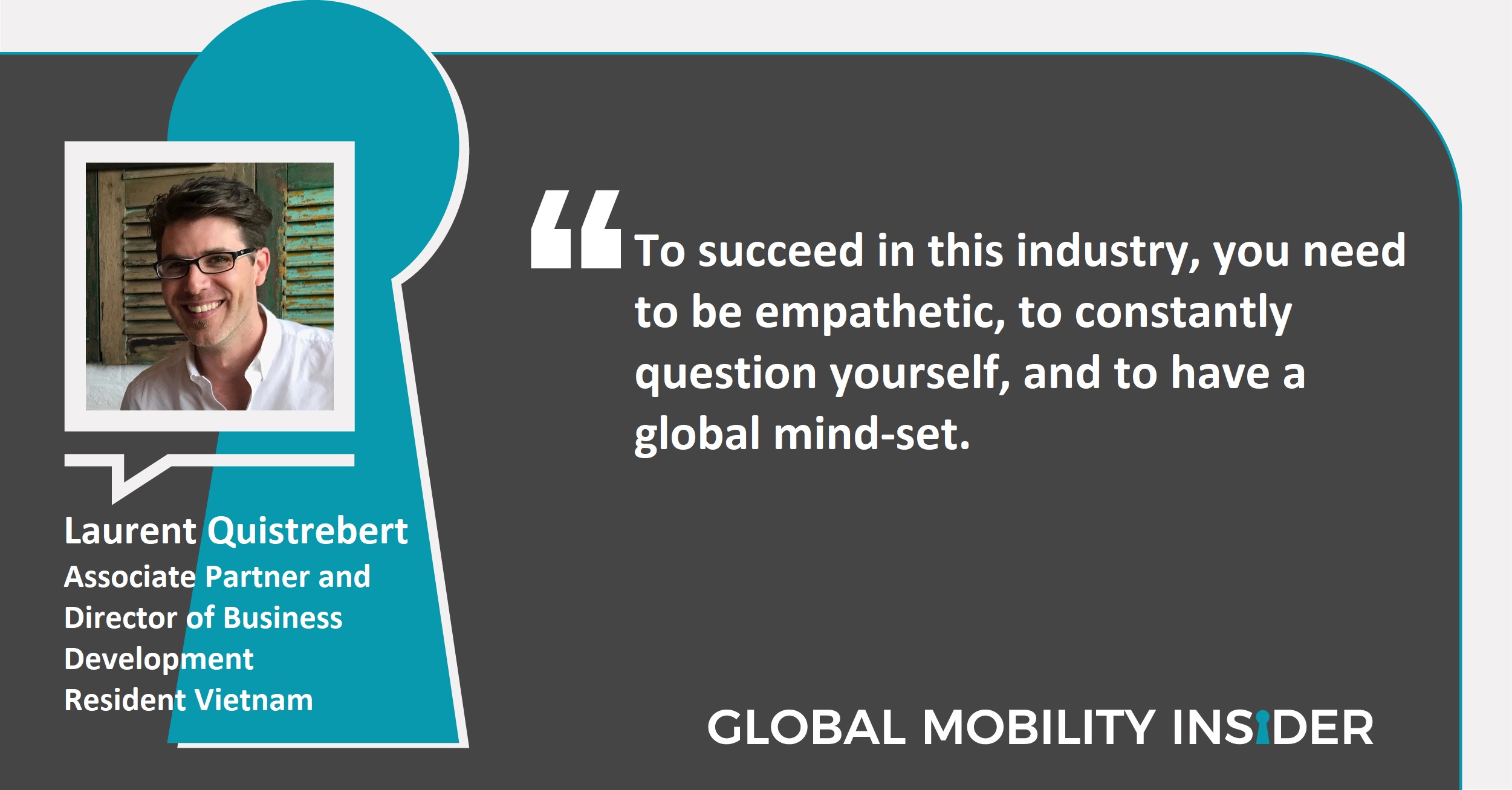Laurent Quistrebert - Associate Partner and Director of Business Development - Resident Vietnam
Name: Laurent Quistrebert
Position: Associate Partner and Director of Business Development
Company: Resident Vietnam

Professional Background
Resident Vietnam, Associate Partner and Director of Business Development (Vietnam): 2007 – Present
Resident Global Vietnam, Associate Partner (Vietnam): 2016 – Present
Vietnam Business Forum - HR sub working group, Vice Chairman (Vietnam): 2014 – Present
Accor, Customer Relation Manager (Vietnam): 2005 – 2007
Career Insider
Q: Why global mobility, and how did you get started in the industry?
A: I would say that it was pure coincidence that led me to this industry or maybe the choice I made to live so far from my roots. I originally settled in Ho Chi Minh City and worked in a 5 star hotel for a little over a year. During that time, I encountered many expats and business travelers every day and it was a pleasure to share with them my experiences in Vietnam, in Saigon, and of working with the Vietnamese. One day, the founder of Resident Vietnam (the first dedicated DSP company in Vietnam), told me that she wanted to expand the business into North Vietnam and establish an office in Hanoi. I did not hesitate very long to take on this challenge and started my adventures in global mobility about 11 years ago.
Click & Like on LinkedIn
Q: Has your own experience as an expat contributed to your work at Resident Vietnam?
A: My experience as a foreigner in Vietnam has strongly contributed to my work at Resident Vietnam both in training and managing the staff as well as helping to improve our company’s services and programs. My own experience has also greatly helped in anticipating and managing our customers’ expectations.
Q: What advice would you give to someone looking to build a career in global mobility?
A: To succeed in this industry, you need to be empathetic, to constantly question yourself, and to have a global mind-set. You also need to be interested in other people’s culture, to respect them as individuals and to listen. Each client has different expectations and needs so you have to be flexible and creative and sometimes explain to the customer why his/her idea or decision may not be the right one for them in their new assignment. It's often difficult but also exciting.
Industry Insider
Q: How do you think the global mobility industry has changed over the years?
A: What has changed the most in the mobility industry in my opinion is the form and the tools used to deliver services and in particular the use of new technologies. The content of DSP programs and the documentation provided to the assignees is more concise today than in the past. As an example, it is rare for DSP providers to still provide a guidebook and other hard copy welcome kits of 250+ pages. No one wants to read so much information or to keep thick books of paper at home anymore when it can all be provided online.
Also, we see that the millennials are more mobile than their parents and grandparents were in the past and so already have more experience traveling abroad. Millennials are therefore often more "resourceful" and can find a relocation less challenging than those who came before. However, the substance and importance of DSP programs remains more or less the same. The role of the DSP remains primarily to explain to assignees the hidden side of the iceberg in the new location. The portion which is visible above water is, in reality, only a small piece of a much larger whole that new assignees need to understand to survive in the new location and avoid possible misunderstandings and frustration. If not addressed, these challenges can result in relationship issues with the locals or even damage the image of the company in that location.
Q: What do you think is the primary thing hindering the global mobility industry's progress?
A: Immigration seems to be the primary thing hindering the mobility industry’s progress. We live in a globalized world in which every country seems to close its doors a little more either for reasons of security, nationalism or local job protection. This poses an obstacle for the global mobility industry and for companies operating worldwide.
Q: What is the most important strategic tip you can give to companies handling global mobility?
A: Choose the right person based not only on his/her technical skills but also their attitude. Prepare the assignee, but also ensure to prepare the spouse so that they can also adapt successfully to their new location. Since the spouse is not directly related to the company, he/she may be neglected at times. It is important to remember that the spouse can have a direct and sometimes very significant impact on the efficiency and success of the expatriate employee and thus impact the mission and objectives of the company.
Visionary Insider
Q: How can global mobility practices get better in the next 5 years?
A: I wish that all companies would anticipate and plan a bit more in advance their employees’ moves and reach out to their mobility partners well before arrival rather than authorizing services at the very last minute. Many times, it seems simply like a box that must be ticked to follow the company policy. Planning better in advance would guarantee the efficiency of the services provided.
Q: What more can be done to improve current global mobility practices to benefit talents on the move?
A: I think that global mobility practices focus too much on the short term to only meet the present objectives. Accompanying expatriate families on arrival and assistance at departure is important, but more support during the expatriation for practical as well as psychological matters should be considered.
It would also seem that preparation for the continuation of the career after the assignment would be of great value to the employee. This would not only benefit talent but also the company in the long term. Too many assignees who are repatriated to their home countries leave the company shortly after repatriation which is I think a sign that a gap has grown between the employer and the employee during the assignment abroad.
Either/Or…
- Short-term or long-term assignment? Both but more and more short-term assignments
- Airbnb or serviced apartments? Serviced apartment
- Excel or global mobility software? Global mobility software
- Lump-sum or flex-ben? Flex Ben
- Facebook or LinkedIn? Both
- Outlook or Gmail? Outlook
- Taxi or Uber? Grab
- iOS or Android? iOS
- Mac or PC? Mac at home, PC at work
- Computer or tablet? Both
- Work hard or play hard? Play hard


Leave a Comment
* Fields marked with this asterisk are mandatory.